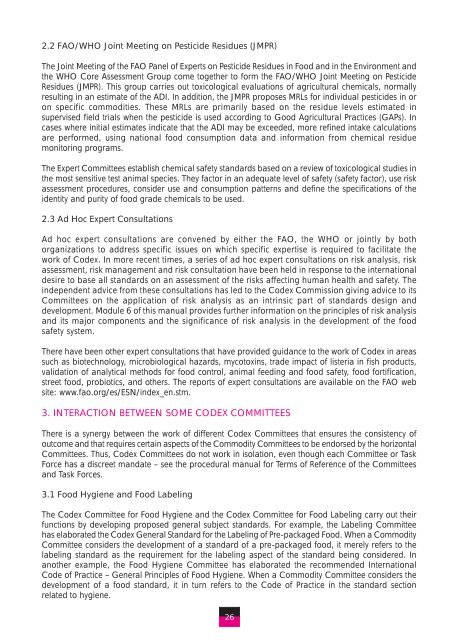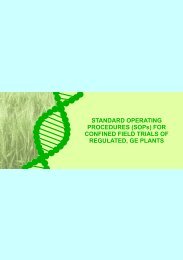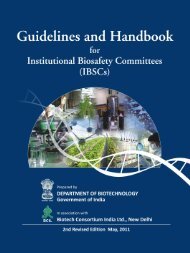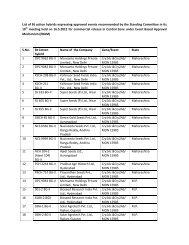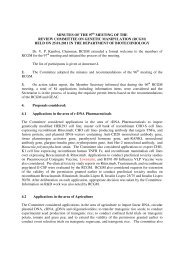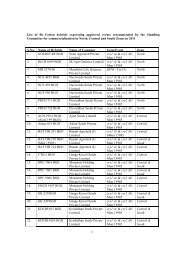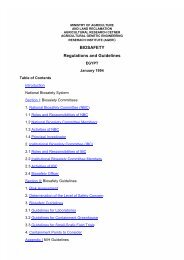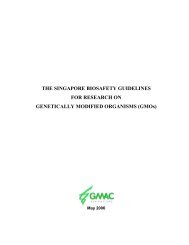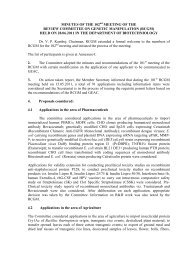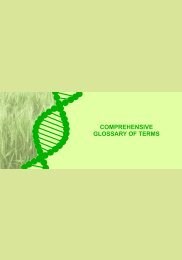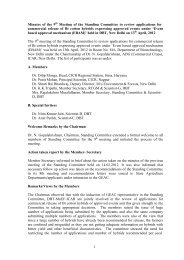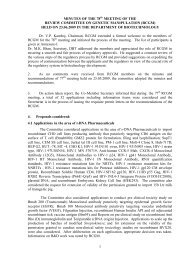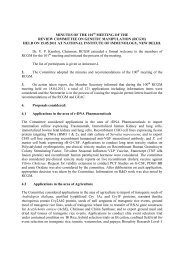THE USER'S MANUAL ON CODEX - Department of Biotechnology
THE USER'S MANUAL ON CODEX - Department of Biotechnology
THE USER'S MANUAL ON CODEX - Department of Biotechnology
You also want an ePaper? Increase the reach of your titles
YUMPU automatically turns print PDFs into web optimized ePapers that Google loves.
2.2 FAO/WHO Joint Meeting on Pesticide Residues (JMPR)<br />
The Joint Meeting <strong>of</strong> the FAO Panel <strong>of</strong> Experts on Pesticide Residues in Food and in the Environment and<br />
the WHO Core Assessment Group come together to form the FAO/WHO Joint Meeting on Pesticide<br />
Residues (JMPR). This group carries out toxicological evaluations <strong>of</strong> agricultural chemicals, normally<br />
resulting in an estimate <strong>of</strong> the ADI. In addition, the JMPR proposes MRLs for individual pesticides in or<br />
on specific commodities. These MRLs are primarily based on the residue levels estimated in<br />
supervised field trials when the pesticide is used according to Good Agricultural Practices (GAPs). In<br />
cases where initial estimates indicate that the ADI may be exceeded, more refined intake calculations<br />
are performed, using national food consumption data and information from chemical residue<br />
monitoring programs.<br />
The Expert Committees establish chemical safety standards based on a review <strong>of</strong> toxicological studies in<br />
the most sensitive test animal species. They factor in an adequate level <strong>of</strong> safety (safety factor), use risk<br />
assessment procedures, consider use and consumption patterns and define the specifications <strong>of</strong> the<br />
identity and purity <strong>of</strong> food grade chemicals to be used.<br />
2.3 Ad Hoc Expert Consultations<br />
Ad hoc expert consultations are convened by either the FAO, the WHO or jointly by both<br />
organizations to address specific issues on which specific expertise is required to facilitate the<br />
work <strong>of</strong> Codex. In more recent times, a series <strong>of</strong> ad hoc expert consultations on risk analysis, risk<br />
assessment, risk management and risk consultation have been held in response to the international<br />
desire to base all standards on an assessment <strong>of</strong> the risks affecting human health and safety. The<br />
independent advice from these consultations has led to the Codex Commission giving advice to its<br />
Committees on the application <strong>of</strong> risk analysis as an intrinsic part <strong>of</strong> standards design and<br />
development. Module 6 <strong>of</strong> this manual provides further information on the principles <strong>of</strong> risk analysis<br />
and its major components and the significance <strong>of</strong> risk analysis in the development <strong>of</strong> the food<br />
safety system.<br />
There have been other expert consultations that have provided guidance to the work <strong>of</strong> Codex in areas<br />
such as biotechnology, microbiological hazards, mycotoxins, trade impact <strong>of</strong> listeria in fish products,<br />
validation <strong>of</strong> analytical methods for food control, animal feeding and food safety, food fortification,<br />
street food, probiotics, and others. The reports <strong>of</strong> expert consultations are available on the FAO web<br />
site: www.fao.org/es/ESN/index_en.stm.<br />
3. INTERACTI<strong>ON</strong> BETWEEN SOME <strong>CODEX</strong> COMMITTEES<br />
There is a synergy between the work <strong>of</strong> different Codex Committees that ensures the consistency <strong>of</strong><br />
outcome and that requires certain aspects <strong>of</strong> the Commodity Committees to be endorsed by the horizontal<br />
Committees. Thus, Codex Committees do not work in isolation, even though each Committee or Task<br />
Force has a discreet mandate – see the procedural manual for Terms <strong>of</strong> Reference <strong>of</strong> the Committees<br />
and Task Forces.<br />
3.1 Food Hygiene and Food Labeling<br />
The Codex Committee for Food Hygiene and the Codex Committee for Food Labeling carry out their<br />
functions by developing proposed general subject standards. For example, the Labeling Committee<br />
has elaborated the Codex General Standard for the Labeling <strong>of</strong> Pre-packaged Food. When a Commodity<br />
Committee considers the development <strong>of</strong> a standard <strong>of</strong> a pre-packaged food, it merely refers to the<br />
labeling standard as the requirement for the labeling aspect <strong>of</strong> the standard being considered. In<br />
another example, the Food Hygiene Committee has elaborated the recommended International<br />
Code <strong>of</strong> Practice – General Principles <strong>of</strong> Food Hygiene. When a Commodity Committee considers the<br />
development <strong>of</strong> a food standard, it in turn refers to the Code <strong>of</strong> Practice in the standard section<br />
related to hygiene.<br />
26


